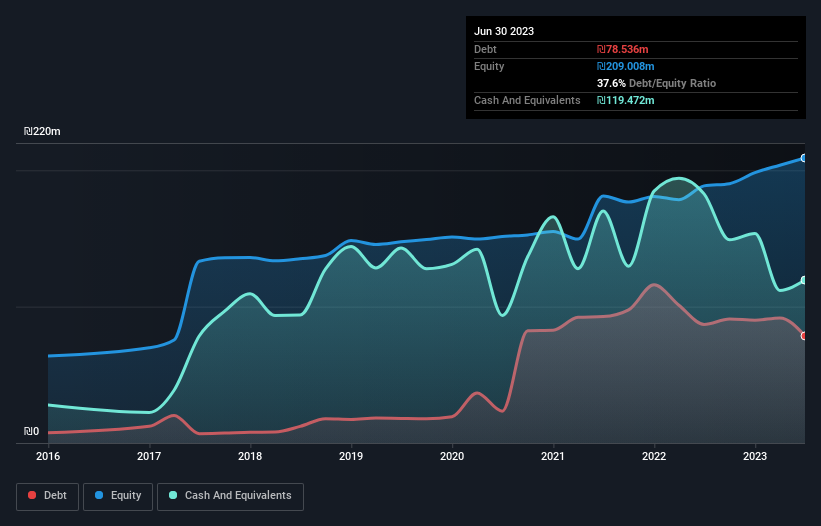Legendary fund manager Li Lu (who Charlie Munger backed) once said, 'The biggest investment risk is not the volatility of prices, but whether you will suffer a permanent loss of capital.' It's only natural to consider a company's balance sheet when you examine how risky it is, since debt is often involved when a business collapses. We note that Lesico Ltd (TLV:LSCO) does have debt on its balance sheet. But is this debt a concern to shareholders?
When Is Debt A Problem?
Debt assists a business until the business has trouble paying it off, either with new capital or with free cash flow. Ultimately, if the company can't fulfill its legal obligations to repay debt, shareholders could walk away with nothing. While that is not too common, we often do see indebted companies permanently diluting shareholders because lenders force them to raise capital at a distressed price. Of course, the upside of debt is that it often represents cheap capital, especially when it replaces dilution in a company with the ability to reinvest at high rates of return. When we examine debt levels, we first consider both cash and debt levels, together.
See our latest analysis for Lesico
What Is Lesico's Net Debt?
The image below, which you can click on for greater detail, shows that Lesico had debt of ₪78.5m at the end of June 2023, a reduction from ₪87.0m over a year. But on the other hand it also has ₪119.5m in cash, leading to a ₪40.9m net cash position.

A Look At Lesico's Liabilities
Zooming in on the latest balance sheet data, we can see that Lesico had liabilities of ₪369.0m due within 12 months and liabilities of ₪44.5m due beyond that. On the other hand, it had cash of ₪119.5m and ₪368.4m worth of receivables due within a year. So it actually has ₪74.4m more liquid assets than total liabilities.
This surplus liquidity suggests that Lesico's balance sheet could take a hit just as well as Homer Simpson's head can take a punch. Having regard to this fact, we think its balance sheet is as strong as an ox. Succinctly put, Lesico boasts net cash, so it's fair to say it does not have a heavy debt load!
Although Lesico made a loss at the EBIT level, last year, it was also good to see that it generated ₪33m in EBIT over the last twelve months. There's no doubt that we learn most about debt from the balance sheet. But you can't view debt in total isolation; since Lesico will need earnings to service that debt. So if you're keen to discover more about its earnings, it might be worth checking out this graph of its long term earnings trend.
Finally, a business needs free cash flow to pay off debt; accounting profits just don't cut it. While Lesico has net cash on its balance sheet, it's still worth taking a look at its ability to convert earnings before interest and tax (EBIT) to free cash flow, to help us understand how quickly it is building (or eroding) that cash balance. Over the last year, Lesico saw substantial negative free cash flow, in total. While that may be a result of expenditure for growth, it does make the debt far more risky.
Summing Up
While we empathize with investors who find debt concerning, you should keep in mind that Lesico has net cash of ₪40.9m, as well as more liquid assets than liabilities. So we are not troubled with Lesico's debt use. When analysing debt levels, the balance sheet is the obvious place to start. But ultimately, every company can contain risks that exist outside of the balance sheet. Be aware that Lesico is showing 2 warning signs in our investment analysis , and 1 of those doesn't sit too well with us...
At the end of the day, it's often better to focus on companies that are free from net debt. You can access our special list of such companies (all with a track record of profit growth). It's free.
New: AI Stock Screener & Alerts
Our new AI Stock Screener scans the market every day to uncover opportunities.
• Dividend Powerhouses (3%+ Yield)
• Undervalued Small Caps with Insider Buying
• High growth Tech and AI Companies
Or build your own from over 50 metrics.
Have feedback on this article? Concerned about the content? Get in touch with us directly. Alternatively, email editorial-team (at) simplywallst.com.
This article by Simply Wall St is general in nature. We provide commentary based on historical data and analyst forecasts only using an unbiased methodology and our articles are not intended to be financial advice. It does not constitute a recommendation to buy or sell any stock, and does not take account of your objectives, or your financial situation. We aim to bring you long-term focused analysis driven by fundamental data. Note that our analysis may not factor in the latest price-sensitive company announcements or qualitative material. Simply Wall St has no position in any stocks mentioned.
About TASE:LSCO
Lesico
Engages in the construction of various infrastructure projects in Israel and internationally.
Slight risk with mediocre balance sheet.
Similar Companies
Market Insights
Community Narratives



